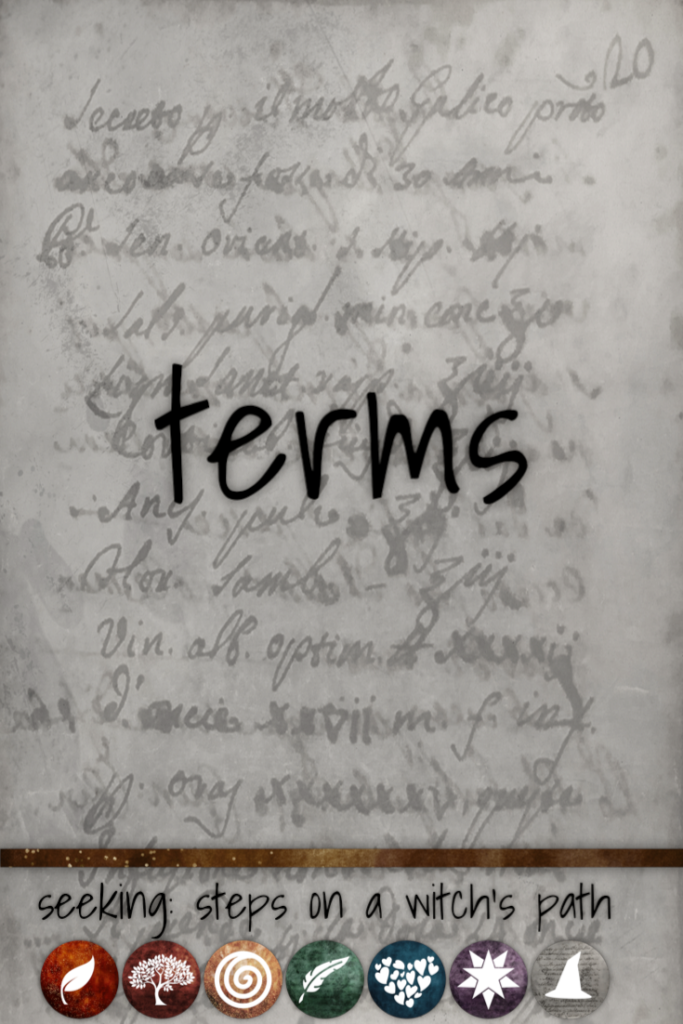It might be helpful to cover some common terms you may come across in discussions of Paganism. Many of these terms are also used about other religions, but you may not have come across some of them before.

You’ll see me use the terms path and tradition fairly frequently.
A path is a larger religious practice or religion unto itself. (Wicca is a path. Celtic reconstructionism is a path. Asatru is a path.) But some paths (Wicca, mostly) have offshoots within the path that are called traditions: much more specific in terms of shared practice, focus, and other details.
If you think of path as roughly equivalent to Christianity or Judaism and a tradition as equivalent to Catholicism, Southern Baptists, Reform Judaism, etc. you’ll be in the right ballpark.
If you ask me what my path is, I say initiatory religious witchcraft. My tradition has a specific name, Omphalos Tri-Cellan, but knowing that doesn’t help other people a lot, since there’s not much available about it outside members of the tradition.
It’s also useful to know some general terms used in religious discussion – or at least be able to refer to them.
There are two common basic approaches to religion: orthopraxic and orthodoxic. In these cases, ortho means ‘right or correct’. Doxic is related to the word ‘dogma’ or belief, and praxic is related to the word ‘practice’.
Orthodoxic religions focus on a shared (’right’) belief system: people in the religion will generally share common beliefs about a range of topics. The best known of these is Christianity: orthodoxic religions often have a shared Creed of belief, such as the Nicene Creed .
Orthopraxic religions are those who share practices. Wicca is in this category, but so is Judaism: to be a good Jew, you don’t need to believe, you simply need to follow the Law as it is set down.
Obviously, no religion is purely practice without belief, or belief without practice. If you start with practices, you need some reason to keep up with them. Otherwise, why do the practices? And if you have beliefs, you are eventually going to build up practices that reflect those beliefs.
Exoteric religions are those open to the public, and generally accept anyone willing to abide by the requirements of the religion. They focus on the needs and demands of daily life – personal struggles, family and job life, community structures, and they are generally accessible to a wide range of people (all ages, genders, backgrounds, interests, etc.) Protestant Christianity is a great example.
Esoteric religions and orders are designed for and focus on a much smaller group – not everyone is considered able, willing, or appropriate to the group’s goals. Just the same way that not everyone may go to (or want to go to) a particular college, not everyone will fit with these goals or practices. Esoteric groups also generally focus on religious mysteries, and often have some initiatory practice. Traditional Wicca is an obvious example, but the Freemasons are another well-known esoteric order.
Finally, eclectic is commonly used in the Pagan community to describe someone who borrows from multiple sources. An eclectic Wiccan is normally someone who borrows from multiple Wiccan traditions and sources, while an eclectic Pagan would borrow from different Pagan paths.
It can be really hard to tell what other people mean when they describe themselves as eclectic, so again, I usually ask for specifics.

(I cover terms about the nature of deity in a separate article.)
Revised July 22, 2020.



